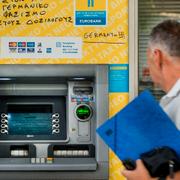
Andersson välkomnar grekisk uppgörelse
Finansminister Magdalena Andersson välkomnar eurogruppens uppgörelse om stora skuldlättnader för Grekland, som blev klar natten till midsommarafton.
Hade uppgörelsen uteblivit fanns det risk för en stökig reaktion på finansmarknaderna.
– Det säger något om situationen om man sitter på natten och diskuterar vad som ska hända 2060, sa hon till journalister vid ekofinmötet på midsommarafton, enligt Nyhetsbyrån Direkt.
Andersson påpekade samtidigt att det ekonomiska läget i EU är betydligt bättre nu än vid den grekiska krisen för tre år sedan.
Läs tidigare
bakgrund
Grekiska skuldkrisen
Wikipedia (en)
The Greek government-debt crisis (also known as the Greek Depression) is the sovereign debt crisis faced by Greece in the aftermath of the financial crisis of 2007–08. Widely known in the country as The Crisis (Greek: Η Κρίση), it reached the populace as a series of sudden reforms and austerity measures that led to impoverishment and loss of income and property, as well as a small-scale humanitarian crisis.
The Greek crisis started in late 2009, triggered by the turmoil of the Great Recession, structural weaknesses in the Greek economy, and revelations that previous data on government debt levels and deficits had been underreported by the Greek government.
This led to a crisis of confidence, indicated by a widening of bond yield spreads and rising cost of risk insurance on credit default swaps compared to the other Eurozone countries, particularly Germany. The government enacted 12 rounds of tax increases, spending cuts, and reforms from 2010 to 2016, which at times triggered local riots and nationwide protests. Despite these efforts, the country required bailout loans in 2010, 2012, and 2015 from the International Monetary Fund, Eurogroup, and European Central Bank, and negotiated a 50% "haircut" on debt owed to private banks in 2011, which amounted to a €100bn debt relief. After a popular referendum which rejected further austerity measures required for the third bailout, and after closure of banks across the country (which lasted for several weeks), on June 30, 2015, Greece became the first developed country to fail to make an IMF loan repayment. At that time, debt levels had reached €323bn or some €30,000 per capita.
Omni är politiskt obundna och oberoende. Vi strävar efter att ge fler perspektiv på nyheterna. Har du frågor eller synpunkter kring vår rapportering? Kontakta redaktionen


